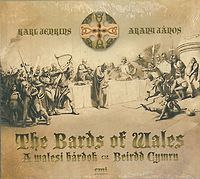The Bards of Wales
The Bards of Wales (Hungarian: A walesi bárdok) is a ballad by the Hungarian poet János Arany, written in 1857. Alongside the Toldi trilogy, it is one of his best known works, published anonymously to evade censorship.
Background[]
Arany and other Hungarian poets were asked to write a poem of praise for the visit of Franz Joseph I of Austria. Arany instead wrote the tale of the 500 Welsh bards sent to the stake by Edward I of England for failing to sing his praises at a banquet in Montgomery Castle.
The analogy criticised the tight Habsburg rule over Hungary since the Hungarian Revolution of 1848. It was a form of passive resistance to the repressive policies of Alexander von Bach in Hungary, and to the planned visit of the monarch.[1]
The poem[]

The poem was written "for the desk drawer" and first published six years later in 1863, disguised as a translation of an Old English ballad, as a way of evading the censorship that ceased only with the Austro-Hungarian Compromise of 1867.
Arany wrote in his preface to the poem, "Historians doubt it, but it strongly stands in legend that Edward I of England sent 500 Welsh bards to the stake after his victory over the Welsh" (in 1277), "to prevent them from rousing the country and destroying English rule by telling of the glorious past of their nation.[1]}}
The royal form of bardic tradition ended in the 13th century with the 1282 Edwardian conquest.[2] The legendary suicide of The Last Bard (in about 1283) was marked in the poem as encoded resistance to the Habsburg repression of that period.[1]
The best-known English translation of the poem was the work of the Canadian scholar Watson Kirkconnell in 1933.[1] In September 2007 an English copy translated by Peter Zollman was donated to the National Library of Wales in Aberystwyth.[3]
Cultural significance[]

All Hungarian students in the sixth grade of elementary school learn "The Bards of Wales" by heart, in view of its literary importance and historical message.[1]
The poem was set to music by the Hungarian band Kaláka in 1989. Dalriada made a different setting in 2003, which was re-recorded and re-released in 2004 and in 2009, on an album with several other settings of Arany poems. The Welsh composer Karl Jenkins wrote a cantata to the Zollman translation of the poem in 2011.[4][5]
See also[]
- "Kurds'komu bratovi", a poem about the Kurds used as a symbol of Ukrainian resistance against the Soviet Union
References[]
- ^ a b c d e "The Bard of Wales" in the Hungarian Electronic Library Retrieved 11 August 2019.
- ^ "Tale of Welsh bards' massacre taught to generations... in Hungary". 2013.
- ^ Crump, Eryl (2012-08-07). "Strengthening the link between Wales and Hungary". WalesOnline. Retrieved 2012-08-07.
- ^ "The Bards of Wales". 2014.
- ^ "WORLD PREMIÈRE OF THE BARDS OF WALES–BEIRDD CYMRU" (PDF). 2011.
Other sources[]
- The Bards of Wales in the Hungarian Electronic Library
- Alternative translation by Bernard Adams
- Peter Zollman's English translation
- Rory Leishman, a Canadian Bard of Wales
- What The Bards of Wales means to a Hungarian-American
- The manuscript of the poem
- The Bards of Wales, translated by Watson Kirkconnel
- 1857 poems
- Ballads
- Hungarian poems
- Cultural depictions of Edward I of England
- 1857 songs
